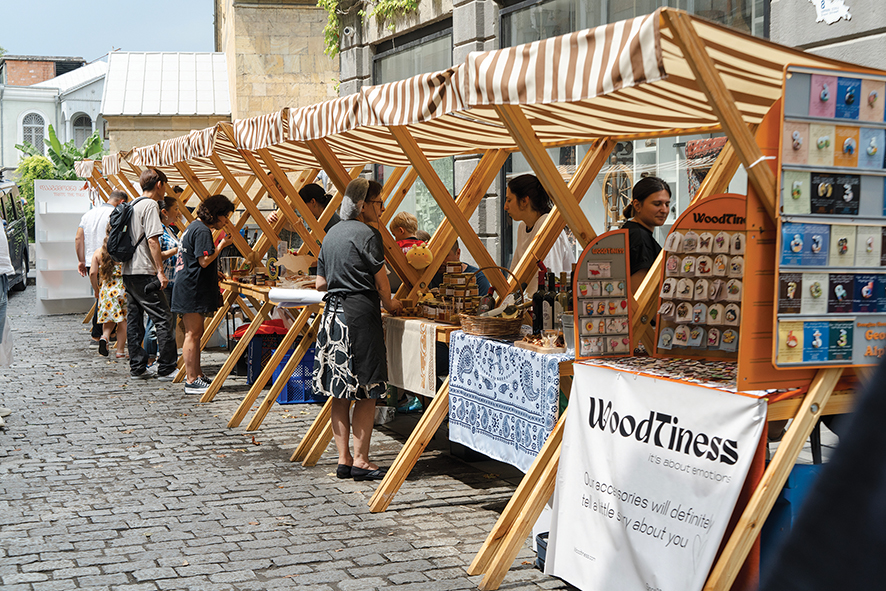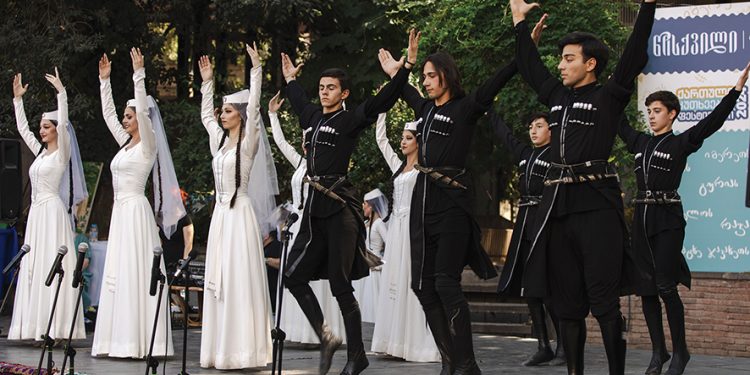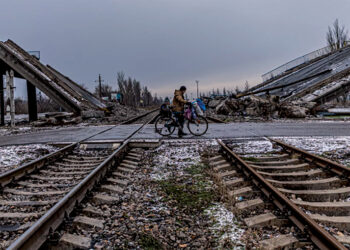Hosted for the second year on July 6 and 7, the ‘Festival of Georgian Regions’ aimed to promote different cultures throughout the country with varieties of wine, cuisine, dances, and folklore.
Founded by the Tsiskvili Group and co-hosted this year with the Meidan Group, the festival brought together tourists and locals alike. It featured six different regions of Georgia, among them Imereti, Racha, Guria, Svaneti, Samegrelo, and Samtskhe-Javakheti. The Marketing Specialist for the Tsiskvili Group, Mariam Sagliani, said the festival worked to showcase cultures and encourage people to travel outside of Tbilisi.
“We’re helping people get to know different regions of Georgia and, after this festival, people will be more interested and want to go there to see with their own eyes the places and the mountains,” said Sagliani.
This year’s festival was moved from the Tsiskvili yard garden to Meidani Square, a central touristic hub in Tbilisi on Sioni Street, where many people stopped to visit as they walked through the Old Town. Sagliani said that the ‘Festival of Georgian Regions’ is for locals as much as it is for foreigners, as they love experiencing their own culture and traditions.
She said it gives local people a good feeling and a chance to see the dance and music from different regions and to taste the cuisine, especially since destinations outside of Tbilisi are not easily accessible to everyone. Sagliani explained how some guests who came to the festival from Svaneti were nearly 90 years old, showing how much they loved and desired to share their culture with others.
“We wanted people to discover the culture of different regions of our beautiful country in one place,” Sagliani told GEORGIA TODAY.
The festival began on June 6 with an opening ceremony, followed by ensemble performances from the Imereti, Samtskhe-Javakheti, and Svaneti regions. The second day featured ensembles and folk music from Racha, Guria, and Samegrelo. During the concerts, performers wore traditional clothing from their region so attendees could see the differences and look in awe at the numerous designs and colors. Throughout both days, there were around 60 companies set up, mostly winemakers, and large and small sellers, to assist in transporting visitors to alternative regions in Georgia.

Natia Tsetskhladze is the organizer and representative of Meidan Group, a real estate development company in Old Tbilisi. She said nearly 300 Georgian wines were presented at the festival, as the substance is a core component of Georgian culture.
“It’s our company’s social responsibility to participate in social festivals such as this throughout the year to promote all things Georgian, since they are in the heart of the city,” she said.
First and foremost, Tsetskhladze said they promote wine because they are proud of it and the culture that surrounds it. This pattern follows them at other events, using wine as the main representation of Georgia.
The festival had various partners, including UN Women Georgia, which supported nine female entrepreneurs so they could present their products. Tsetskhladze said this was a valuable aspect of the festival for the Meidan Group.
“For us, it’s very important to have entrepreneurs included in events like this, especially women entrepreneurs,” said Tsetskhladze. “It’s important for our two companies but also for the country and Georgian culture.”
The Tsiskvili Group is a large restaurant chain in Georgia that was founded in 2002. In addition to providing food, Sagliani said they rely heavily on promoting Georgian hospitality, architecture, culture, cuisine, and folklore. The chain currently has eight restaurants, two markets, and a dining theater where they offer performances and cuisine to locals and tourists.
Sagliani said the owners of Tsiskvili Group always wanted to start a festival so people could see the united culture of the country and to further preserve the rich heritage of Georgia.
Other festival supporters included the Ministry of Agriculture, the City Hall, and partner municipalities from Kutaisi, Oni, Chokhatauri, Akhaltsikhe, Senaki, and Mestia.
According to Sagliani, the festival will continue annually, in hopes that it will grow from representing six regions, to all of them. There are more than ten regions in Georgia made up of different terrain, languages, cuisines, and garments.
“Tusheti is quite new for tourists – a lot of nature, no big hotels, so it’s a very interesting and unique place in Georgia… but of course, every region has unique sights,” she said.
By Shelbi R. Ankiewicz














